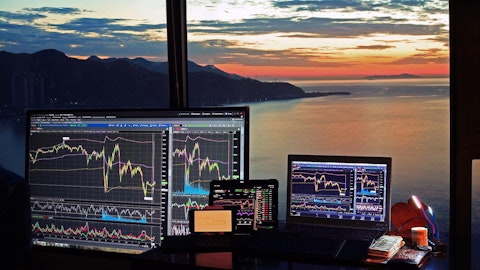Michael Rollins: Thanks. And just on the business on the organic performance, is there anything that we should be mindful of just in terms of any churn events over the coming 12 months to 18 months that you have visibility in?
Steve Howden: Mike, nothing that’s sort of — nothing that would be unusual. Nothing significant that we are aware of at this point in time. I think it goes without saying that, the shape of our quarters will be impacted by the devaluation in Nigeria. So just to remind you all and you will see this in the materials that we have published today. Although the devaluation in Nigeria happened in the middle of June, so only two weeks’ impact in the quarter that we have just reported and it’s not hugely visible in the numbers that we report from a KPI perspective, obviously, balance sheet and financing costs, yes, but revenue, EBITDA or RLFCF, et cetera, not impacted. You will see the fuller impact of that come through in Q3, and obviously, resets from contracts starting to happen in Q3, in Q4 and then escalations coming through typically in Q1 as we have told people in the past.
So just bear in mind that, that shape of earnings to come, obviously, all embedded within the guidance that we have updated today.
Michael Rollins: Thank you.
Operator: Your next question comes from the line of…
Sam Darwish: Thanks, Michael.
Operator: Brett Feldman from Goldman Sachs. Your line is open.
Brett Feldman: Thanks, guys. Two, I guess, sort of modeling oriented and then a bigger picture question. So then just first, of the $31 million improvement to your outlook this year, unrelated to the currency movements. How much of that was captured in the second quarter and how much of it is going to flow through in the second half? The second one is, on Project Green, you sort of reiterated the savings you expect by the end of the project. Is that updated for the avoidance of the VAT or could that be incremental or am I just thinking about that wrong? And then the higher level question is, it gets back to capital allocation. You are operating closer to the low end of your leverage range right now, I know it will drift up a little bit, but you are in a pretty good liquidity position.
It doesn’t seem like the conditions are supportive of M&A right now for a range of reasons and as much as you would like to buyback a lot of your stock, you have noted you want to be mindful of the float. And so the big picture question is, in light of all of that, how are you likely going to prioritize excess capital over the next year or so? Is this mostly about just building liquidity and paying down debt or do you think that there’s other opportunities right now that you think that could be even more accretive? Thank you.
Steve Howden: Okay. Brett, I just wrote down a few things. You might just remind me the first one. I will take the VAT one first in relation to Project Green. So that won’t impact the rollout Project Green that VAT is on diesel import. So not related to the actual project bringing new equipment, deploying your commitment…
Brett Feldman: But would you save more money now?
Steve Howden: Right. Exactly. Yeah. Yeah. Exactly. I was just going to say, where you could see some potential positive impact, all else being equal, is that a saving from diesel on a unit basis would now be 7.5% higher. So, yes…
Brett Feldman: Okay.
Steve Howden: … you could — we could see some potential benefit from that, all else being equal. On the capital allocation point, sorry, Brett, you want to jump in? What as your first question again? Can you just remind me, sorry?



